Bildung, Kompetenzen und Arbeitsmarkt
Die Forschungsgruppe erforscht die Entstehung und die Auswirkungen von Kompetenzen. Als wesentliche Bestimmungsfaktoren für die Entwicklung von Kompetenzen untersucht die Gruppe insbesondere den familiären Hintergrund, schulische Bildung und Weiterbildung am Arbeitsplatz. Effekte höherer Kompetenzen auf den Arbeitsmarkterfolg werden über die gesamte berufliche Laufbahn hinweg analysiert. Außerdem beschäftigt sich die Gruppe mit Veränderungen in der Nachfrage nach Kompetenzen infolge von technologischem und strukturellem Wandel.
Forschungscluster
Produktivität und InstitutionenIhr Kontakt

- Abteilung Strukturwandel und Produktivität
Referierte Publikationen
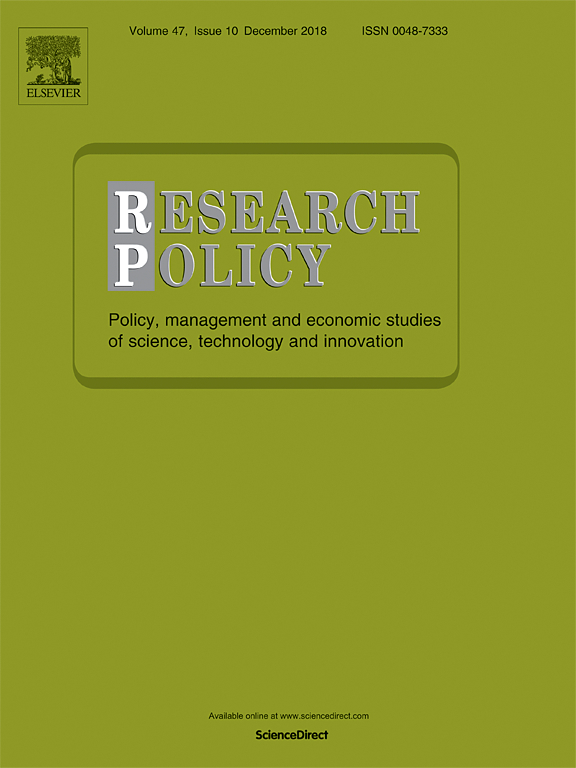
Skill Mismatch and the Costs of Job Displacement
in: Research Policy, Nr. 2, 2024
Abstract
<p>Establishment closures have lasting negative consequences for the workers displaced from their jobs. We study how these consequences vary with the amount of skill mismatch that workers experience after job displacement. Developing new measures of occupational skill redundancy and skill shortage, we analyze the work histories of individuals in Germany between 1975 and 2010. We estimate difference-in-differences models, using a sample of displaced workers who are matched to statistically similar non-displaced workers. We find that displacements increase the probability of occupation change eleven-fold. Moreover, the magnitude of post-displacement earnings losses strongly depends on the type of skill mismatch that workers experience in such job switches. Whereas skill shortages are associated with relatively quick returns to the earnings trajectories that displaced workers would have experienced absent displacement, skill redundancy sets displaced workers on paths with permanently lower earnings. We show that these differences can be attributed to differences in mismatch after displacement, and not to intrinsic differences between workers making different post-displacement career choices.</p>
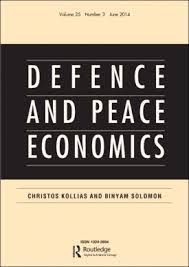
Exposure to Conflict, Migrations and Long-run Education and Income Inequality: Evidence from Bosnia and Herzegovina
in: Defence and Peace Economics, Nr. 8, 2023
Abstract
<p>We investigate the long-term relationship between conflict-related migration and individual socioeconomic inequality. Looking at the post-conflict environment of Bosnia and Herzegovina (BiH), a former Yugoslav state most heavily impacted by the wars of the early 1990s, the paper focuses on differences in educational performance and income between four groups: migrants, internally displaced persons, former external migrants, and those who did not move. The analysis leverages a municipality-representative survey (n ≈ 6,000) that captured self-reported education and income outcomes as well as migration histories. We find that individuals with greater exposure to conflict had systematically worse educational performance and lower earnings two decades after the war. Former external migrants now living in BiH have better educational and economic outcomes than those who did not migrate, but these advantages are smaller for external migrants who were forced to move. We recommend that policies intended to address migration-related discrepancies should be targeted on the basis of individual and family experiences caused by conflict.</p>
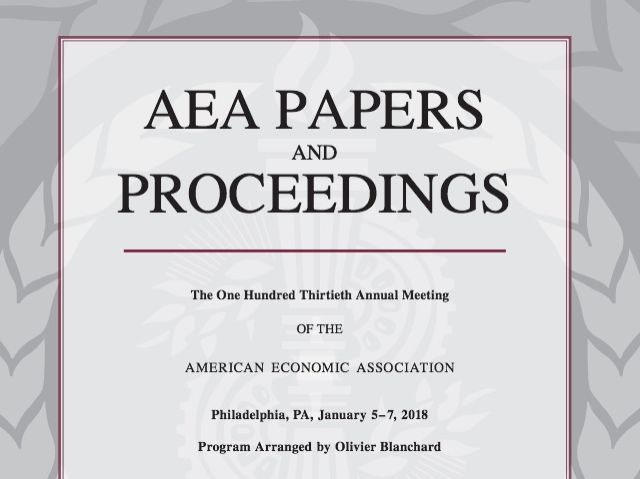
Males Should Mail? Gender Discrimination in Access to Childcare
in: American Economic Association Papers and Proceedings, May 2023
Abstract
<p>This study investigates discrimination against women when searching and applying for childcare in a nationwide field experiment. We send emails from fictitious parents to 9,313 childcare centers in Germany inquiring about access to childcare. We randomize whether the email is sent by the child's mother or father. Our results show that women receive shorter and less positive responses than men. The probability of receiving a response does not differ by gender, highlighting the importance of going beyond response rates to detect discrimination. We provide suggestive evidence that regional differences in gender discrimination are related to gender norms.</p>

The Impact of Delay: Evidence from Formal out-of-Court Restructuring
in: Journal of Corporate Finance, February 2023
Abstract
<p>Different types of bankruptcy restructuring procedures are used in most legal systems to decide the fate of businesses facing financial hardship. We study how bargaining failures in an under-researched type of restructuring procedure, a formal out-of-the court procedure impacts the economic performance of participating firms. Croatia introduced a “pre-bankruptcy settlement” (PBS) process in the wake of the Great Recession of 2007–2009. A novel dataset provides us with annual financial statements for both sides of more than 180,000 debtor–creditor pairs, enabling us to address selection into failed negotiations by matching a rich set of creditor and debtor characteristics. Failures to settle at the PBS stage due to idiosyncratic bargaining problems, which effectively delay entry into the standard bankruptcy procedure, lead to a lower rate of survival among debtors as well as reduced employment, revenue, and profits. We are the first study to track how bargaining failures diffuse through the network of creditors, finding a significant negative effect on small creditors, but not others. Our results highlight the impact of delay and the importance of structuring bankruptcy procedures, to rapidly resolve uncertainty about firms’ future prospects.</p>

Returns to ICT Skills
in: Research Policy, Nr. 7, 2021
Abstract
<p>How important is mastering information and communication technology (ICT) on modern labor markets? We answer this question with unique data on ICT skills tested in 19 countries. Our two instrumental-variable models exploit technologically induced variation in broadband Internet availability that gives rise to variation in ICT skills across countries and German municipalities. We find statistically and economically significant returns to ICT skills. For instance, an increase in ICT skills similar to the gap between an average-performing and a top-performing country raises earnings by about 8 percent. One mechanism driving positive returns is selection into occupations with high abstract task content.</p>
Arbeitspapiere
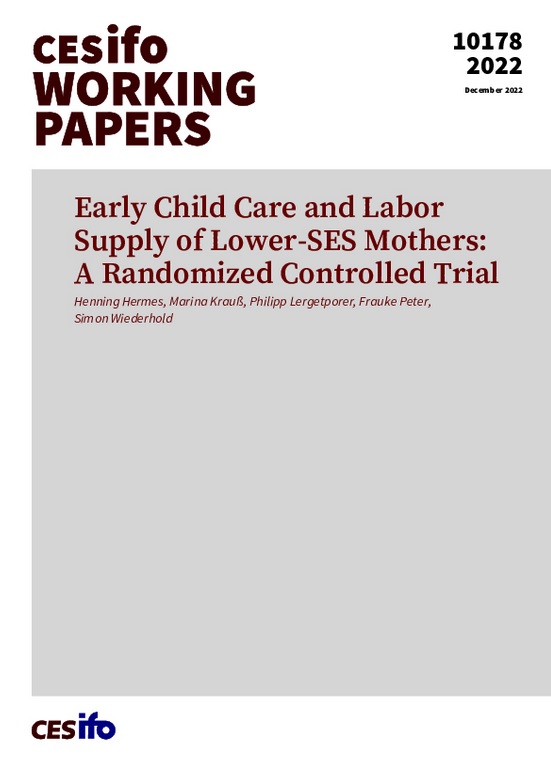
Early Child Care and Labor Supply of Lower-SES Mothers: A Randomized Controlled Trial
in: CESifo Working Paper, Nr. 10178, 2022
Abstract
<p>We present experimental evidence that enabling access to universal early child care for families with lower socioeconomic status (SES) increases maternal labor supply. Our intervention provides families with customized help for child care applications, resulting in a large increase in enrollment among lower-SES families. The treatment increases lower-SES mothers' full-time employment rates by 9 percentage points (+160%), household income by 10%, and mothers' earnings by 22%. The effect on full-time employment is largely driven by increased care hours provided by child care centers and fathers. Overall, the treatment substantially improves intra-household gender equality in terms of child care duties and earnings.</p>
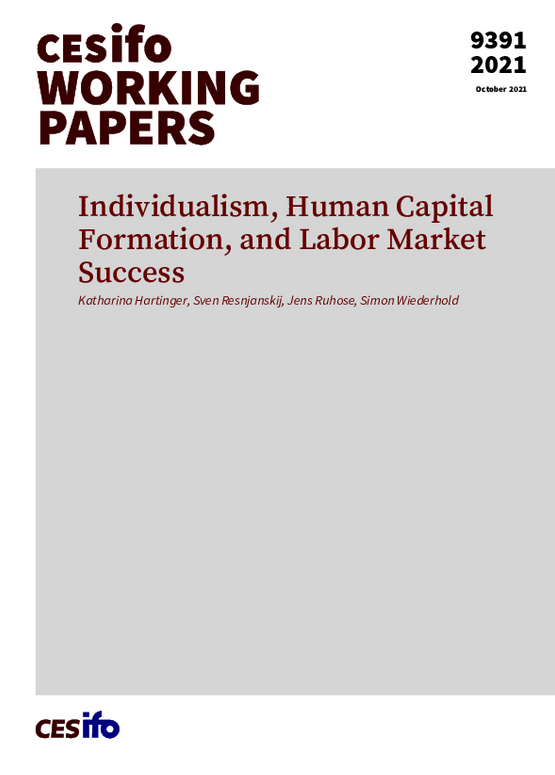
Individualism, Human Capital Formation, and Labor Market Success
in: CESifo Working Paper, Nr. 9391, 2021
Abstract
<p>There is an ongoing debate about the economic effects of individualism. We establish that individualism leads to better educational and labor market outcomes. Using data from the largest international adult skill assessment, we identify the effects of individualism by exploiting variation between migrants at the origin country, origin language, and person level. Migrants from more individualistic cultures have higher cognitive skills and larger skill gains over time. They also invest more in their skills over the life-cycle, as they acquire more years of schooling and are more likely to participate in adult education activities. In fact, individualism is more important in explaining adult skill formation than any other cultural trait that has been emphasized in previous literature. In the labor market, more individualistic migrants earn higher wages and are less often unemployed. We show that our results cannot be explained by selective migration or omitted origin-country variables.</p>
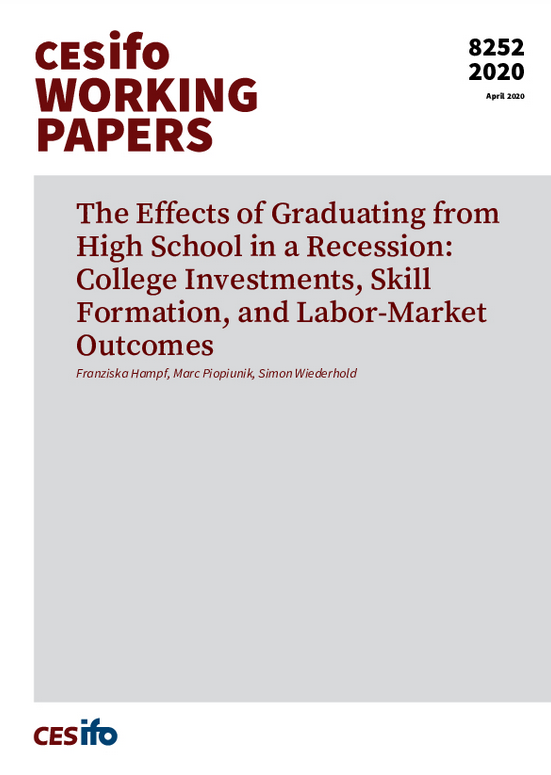
The Effects of Graduating from High School in a Recession: College Investments, Skill Formation, and Labor-Market Outcomes
in: CESifo Working Paper, Nr. 8252, 2020
Abstract
<p>We investigate the short- and long-term effects of economic conditions at high-school graduation as a source of exogenous variation in the labor-market opportunities of potential college entrants. Exploiting business cycle fluctuations across birth cohorts for 28 developed countries, we find that bad economic conditions at high-school graduation increase college enrollment and graduation. They also affect outcomes in later life, increasing cognitive skills and improving labor-market success. Outcomes are affected only by the economic conditions at high-school graduation, but not by those during earlier or later years. Recessions at high-school graduation narrow the gender gaps in numeracy skills and labor-market success.</p>













